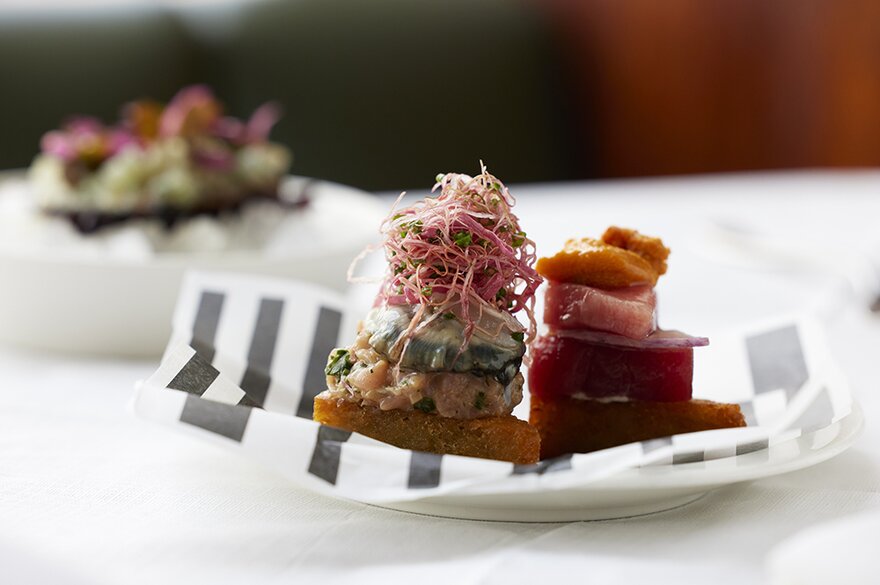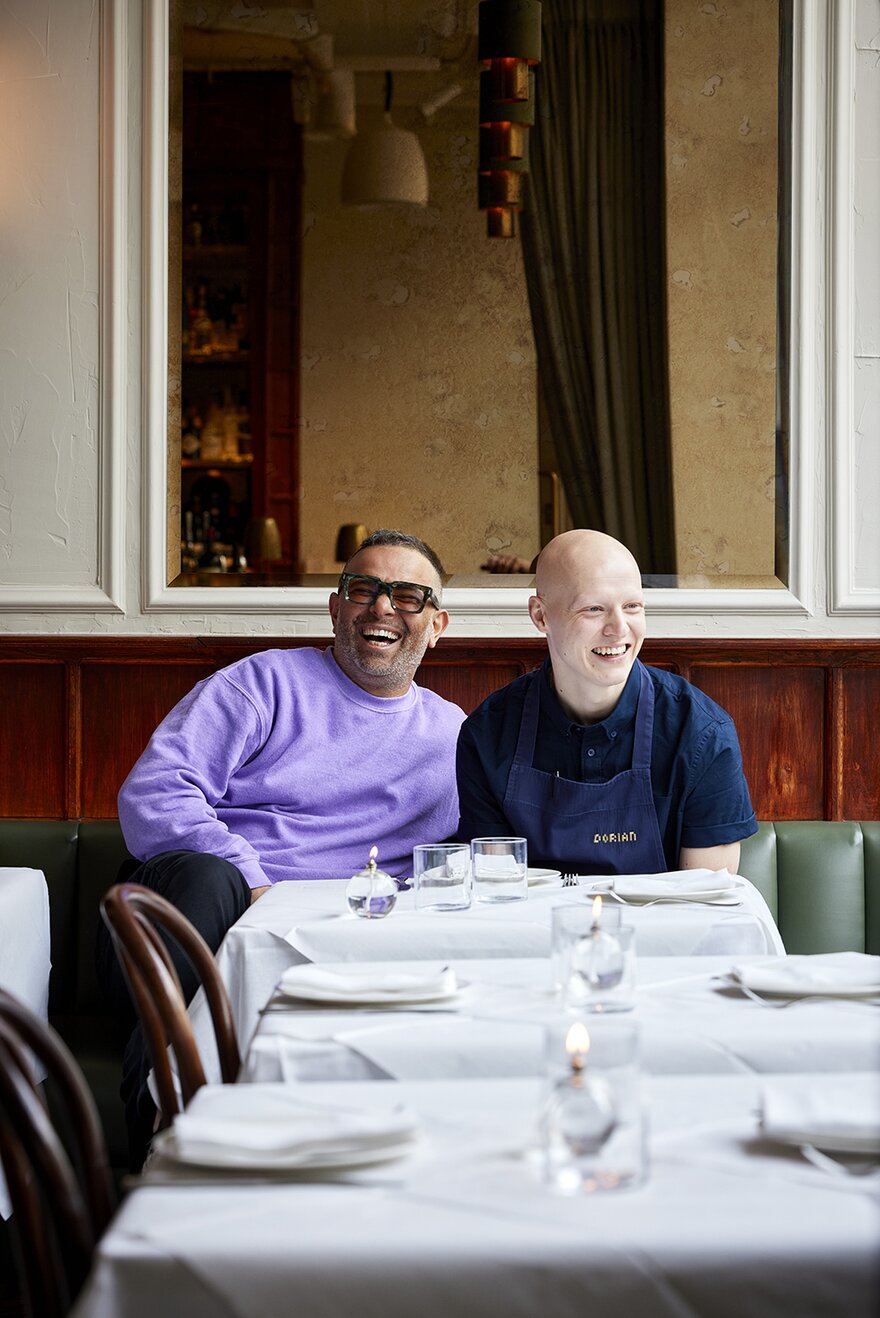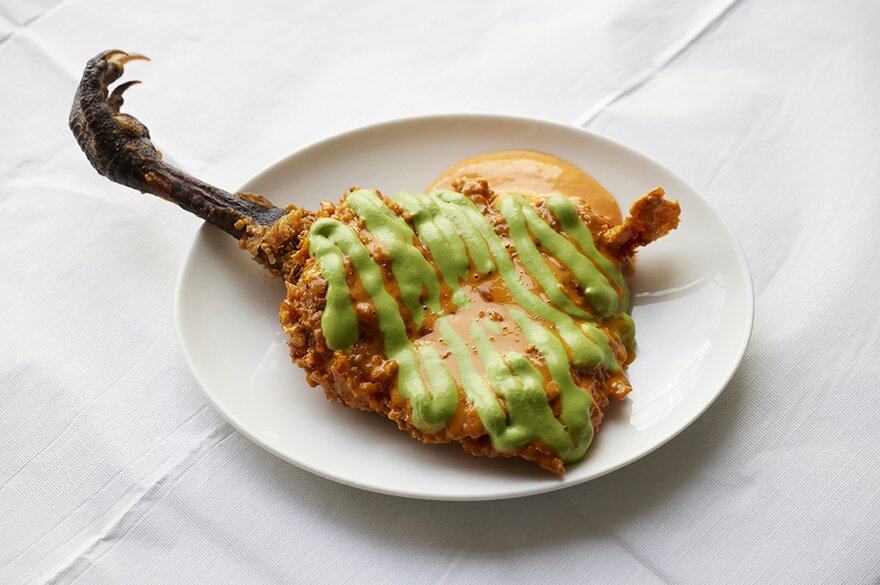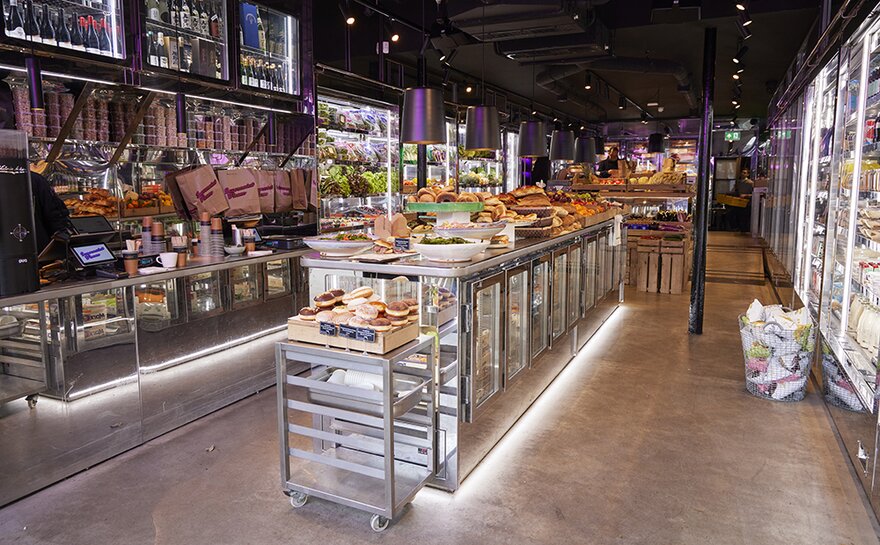Chris D'Sylva has a razor-sharp instinct for what the Notting Hill residents want, and his next target is Dorian, an offshoot of his high-concept, high-quality Supermarket of Dreams
Few go from pop-up fish stall to Michelin star in four years. But then few know their market quite like Chris D'Sylva. The man behind Notting Hill Fish + Meat, Supermarket of Dreams and now Dorian knows London's Notting Hill like no other.
What started as a £50,000 investment in a fishmonger to prop up his local supplier and continue to service his community has grown to a £20m-turnover empire that encompasses fresh fish, meat and vegetables of the highest quality, pre-prepared meals befitting the classy postcode, and a restaurant now recognised by Michelin. It has all happened at quite a pace, but there's more to come from Notting Hill's hospitality linchpin.
He may have been born in Australia, but D'Sylva has tapped into exactly what makes W11 tick since he set foot in west London at the age of 25. Back then he was in advertising, working his way up to brand strategy at General Motors and moving to Detroit. He returned in the early 2010s with his family, and started hospitality projects before settling on the scheme that would underpin his empire.
We meet where it began, in Notting Hill Fish + Meat. It's immediately evident that D'Sylva is at the centre of the community, greeting every well-heeled shopper like an old friend as they stock up on live langoustines, fatty tuna and dry-aged beef specially reared from German Holstein dairy cattle and Japanese black beef.
It was here in 2019 that D'Sylva set up a fish counter, working with Fredrik Lindfors, who was looking for a new home for his produce after the closure of the Fish Shop that was connected to D&D London's Kensington Place restaurant.
"All us locals shopped there, but D&D are in the restaurant business and weren't interested in it. So I approached Fred and said let's do this pop-up and see what happens," D'Sylva explains. The pair opened what is now Notting Hill Fish + Meat, spending £50,000 on a minimal fit-out in a former gallery, including £750 on a mobile fish display. Having been burnt on a previous venture – better chicken brand Schmaltz, that D'Sylva describes as "a £500,000 mistake" – he was keen to get the produce right while protecting the pounds.
"I said to Fred, people just want the freshest fish," he says. "It doesn't have to be a million-pound fit out. The high street was in trouble and I didn't want to throw good money after bad. So we opened and I was scaling fish and pot-wash. We had to go in fast to get there before other established brands."
A super idea
The business was doing well, trading off the goodwill built up by Lindfors, but it was when Covid hit that D'Sylva sensed his opportunity to make it the epicentre of Notting Hill lockdown life. He knew the pandemic was on its way after speaking to suppliers in Singapore and he knew he had to protect the business. So in a moment of inspiration, D'Sylva re-registered the business from a fishmonger to a supermarket in case on a technicality speciality stores were closed during lockdown.
It was a defensive move that came at no cost but proved prescient.
"With my advertising brain I thought: ‘What would my supermarket look like if I wanted to run one?," he says. "So I went about answering my own brief. I didn't want to fabricate something – I had to build it on my DNA."
That identity was driven by selling fish to private chefs in the area and increasingly to locals looking for luxury during lockdown. Soon D'Sylva realised he could sell them vegetables and meat too, so he did deals with other suppliers that had seen sales slump due to closures during the pandemic.
"HG Walter came and put a butcher stand in, Natoora did vegetables, Neal's Yard Dairy had a concession. It was the urgency – they didn't know what to do after they lost all their hospitality sales," he says. "And it was that moment, in that urgency, that they listened to me. I said, you come here, you don't owe me, it's free. What I knew was I'd get the cred and credits in the bank with them for me to ask a favour down the line.
"I couldn't start without the likes of HG Walter as I had to take on some big [retail] names locally – being the fourth butcher in a saturated geographical area is madness. But my customers all know that when they eat a veal chop at the River Café that veal chop is HG Walter. So, the idea of a chefs' supermarket came about, where people can pick and mix, at no minimum quantities. And it would be aspirational for all the households and foodies around here too."
Meanwhile, D'Sylva quickly worked up an online proposition to secure an uninterrupted link to customers throughout lockdown.
"Within a week we had switched to digital and had trackable delivery to anywhere in London within an hour," he says. "That's my advertising and American experience – get shit done. Learn once in the market. That's our style. We don't plan, we just do, and we iterate once we're in."
He needed a facility to perform online picking, packing and dispatch, but plans for the Holland Park Avenue site he found soon grew to become the Supermarket of Dreams. Here D'Sylva brought together products from other restaurant brands and began creating his own high-quality ready meals and pre-prepared sushi.
"The joke is it's our version of a Tesco Express but with wagyu and caviar on the shelves," he says.
Those shelves are within futuristic bespoke mirror-polished stainless steel fridges illuminated by LED lighting, containing sushi prepared by his team of 20 chefs who service the supermarket, delivery orders and the site's evening alter-ego, the Izakaya at Dreams. They work from a basement restaurant around the corner, which currently serves as a dark kitchen and grocery store, but will soon take the form of a Japanese bistro called Urchin.
By day Supermarket of Dreams guests browse the shelves for supplies, and by night diners are tempted in by a hot pink neon sign. The fridges are covered in black velvet and the wooden top in the centre forms the table for a Japanese restaurant where an average of 60 covers are served à la carte sushi.
"Our sushi is so good as we're not in the sushi business, we're in the fish business," D'Sylva says. "No sushi group buys as much fish as we do. They don't have the scale, the priority or the skill. That's why we can put out well-priced, amazing sushi."
Picture perfect
Most of the pre-packaged dishes sold in the Supermarket of Dreams are made under what has now become Dorian. It's another example of D'Sylva's entrepreneurial spirit, approaching a project with one plan and soon shifting to embrace greater possibilities.
"I needed a production facility and gave up on archways and industrial units. Culture is at the centre of everything we do and I didn't want to split the culture of the business," he says. "If you have a team in a windowless factory 10 miles away you have a two-tier operation. I wanted them to be connected and see how customers interact with the produce."
So D'Sylva found a site that was off-pitch, where he planned to black out the windows and turn it into a production facility, making all the food for the supermarket shelves.
"It was cheaper than an archway and 400 metres from the fish shop," he says. "Then my agent said the owners wanted a bustling restaurant, so if I wanted the lease, I'd have to run a restaurant. I thought, I know what to do, I'll create a bistro with our produce."
He teamed up with chef Max Coen, whose experience includes Kitchen Table and Ikoyi in London and Restaurant Frantzén in Stockholm, to develop his vision of a bistro fit for the Notting Hill crowd.
"Some places had opened locally and the quality was unacceptable – but they were full! It gave me the motivation to do my own thing. I've got the network of chefs, I've got the rapport, I've got the produce," D'Sylva says.
Dorian was to be Notting Hill's version of a bistro, with no compromise on technique or quality of ingredients. In business D'Sylva has an unpretentious quality, and that's the atmosphere he's created at the restaurant that has now been rewarded a Michelin star.
The name is inspired by Oscar Wilde's Dorian Gray, who famously only wants to pursue beauty and vanity, but this Dorian is more hedonism and opulence, according to D'Sylva. "He had a lot of bad habits, he was a naughty boy. I want people to know they can have a bit of fun when they come. I describe it as being on the right side of wrong."
All the bistro prompts are present, with a black and white checked floor, tightly packed tables covered in tablecloths, green banquettes and an open-plan kitchen.
"Our priority is superior quality," D'Sylva says. "This is the way we've attracted fine dining chefs with amazing credentials. But we do honest portions on white plates. Everything you're paying for is in the middle of the plate."
It may be a buzzy bistro atmosphere in the 40-cover dining room, but the produce is elevated, with the likes of Landes chicken served on a Sunday covered in morels and truffle, while the dish that has become the restaurant's trademark – the potato rösti – might be served with crab and blood orange, Vacherin Mont D'Or, or morel and Périgord truffle.
"I have full reign to play around," confirms head chef Max Coen. "We were dynamic at Ikoyi as well and played around with flavours. Here, there is no five-day testing process, we combine the flavours and send it out. Chris and I align like that – our minds work the same in that we go for it. Our philosophy is to get hold of the best produce and then to think about what's around it."
He adds that the appeal of working with D'Sylva was the access to outstanding produce combined with the culture, in particular the atmosphere in the restaurant.
"Lunch is a lot more relaxed than dinner," he says. "The lights go down in the evening and it's really intense. It's buzzy, loud and crammed. But that's what we do: lively and dynamic. It gives us an edge. People know there's always a vibe and that we're always busy."
Meanwhile, D'Sylva makes sure that the guests reflect the dynamism of the restaurant.
"You cannot book at 8pm unless I approve it," he says. "It's a members' club without membership. The membership is: do you shop at the fish shop? Are you my neighbour? Are you industry? Are you a nice person? Or are you Hollywood?"
It may sound exclusive, but true to the foundations of the business, D'Sylva just wants to make sure he's looking after his neighbours, who in turn look after him.
"I'm a neighbour before a trader," he grins.
Turn up the volume
The strength of Chris D'Sylva's business comes from being a supplier before a restaurant operator. Having access to the finest produce at a great price, because of the volume that it sells, means prices can be kept keen, while the fish and meat will always be exceptional.
"We are in the retail, wholesale business so our procurement – the scale, the quality, the contacts – is better than any restaurant group," D'Sylva confirms.
"That throughput funds the quality at Dorian. We can get amazing beef cheaper than some big names because of the throughput and the ecosystem. If my steak was price-commensurate with everything else, it would be £200. And no matter how good it tastes, you would never get past the price. Whereas now, they taste it and say it's the best steak in London – though of course there's still a sticker shock."
Meanwhile, the buying power is so big that the business is able to bring in fresh fish on a Sunday and Monday as it has given fishermen motivation to go out for them by committing to purchase their entire catch.
"We're the first to have fresh fish every day; that's one of our promises," D'Sylva adds. "We innovated fresh fish Sundays and fresh fish Mondays. And our sushi is always the best as nobody else buys as much fish as we do."
Urchin: the best of British with Japanese flavours
Having just received recognition from Michelin for his take on an opulent bistro with Dorian, D'Sylva has now turned his sights on reimagining Japanese food with a new restaurant called Urchin. With a team of 20 sushi chefs working from a basement restaurant to service Deliveroo orders and the supermarket shelves, as well as running the Izakaya of Dreams, he has a readymade workforce for his new concept.
"I've got 20 sushi chefs to keep happy and when I told them we were getting a star and that it would lift our business, they said ‘we want our own place now'," D'Sylva confirms.
"It's not usually how I come about ideas: I don't create concepts to solve internal issues but to service gaps in the market."
The site on Holland Park Avenue will become what he describes as a Japanese bistro.
"Sushi is only a fraction of Japanese so I'm going to ‘Japanesify' Dorian. Whole fish and big steaks with Japanese sauces and flavours," D'Sylva adds.
"Japanese isn't cosy and comforting unless you're having a big bowl of ramen. I don't want to do that, I want it to be a sharing-style format but still comfort food.
"Let's say I find an 800g pristine red mullet from Cornwall. If I give it to my sushi chef he's going to slice it up and steam some rice, but that fish could be served whole, almost Thai-style, but with a Japanese garnish. We'll take the best of British produce and make it into Japanese-style dishes we haven't seen yet."
Freeform strategy with a community feel
Having grown the business so speedily from relatively humble beginnings, you'd think it was all part of a grand plan. Not so, says D'Sylva, who prefers to react to market conditions and take advantage when opportunities arise.
"It's all self-funded, no investors," D'Sylva explains. "I started with a £50,000 investment. I've had to put a bit extra in back in July 2022 just because of price increases and delays on Dorian for cashflow, but otherwise it's all self-funded. Now we're projecting an annual turnover of £20m."
He adds: "Coming from the world of strategy I find having a strategic plan is arrogant. It boxes your thinking in. If I was boxed into a plan with an investor, I couldn't be agile.
We couldn't do this unless it was wholly owned by me and I had a risk profile and confidence in what I was doing from a marketing point of view. I also know my edge and that is Notting Hill. As long as I keep the quality I can create whatever I want as long as it has that quality running through it and people will support it. But I realise it's not a given – I have to earn my stripes.
"Rather than focus solely on Supermarket of Dreams I'm getting so much edge in my local neighbourhood that I know all the gaps. We're very W11-centric. We lean into the local network. Our edge is that we're by locals for locals."
Continue reading
You need to be a premium member to view this. Subscribe from just 99p per week.
Already subscribed? Log In













